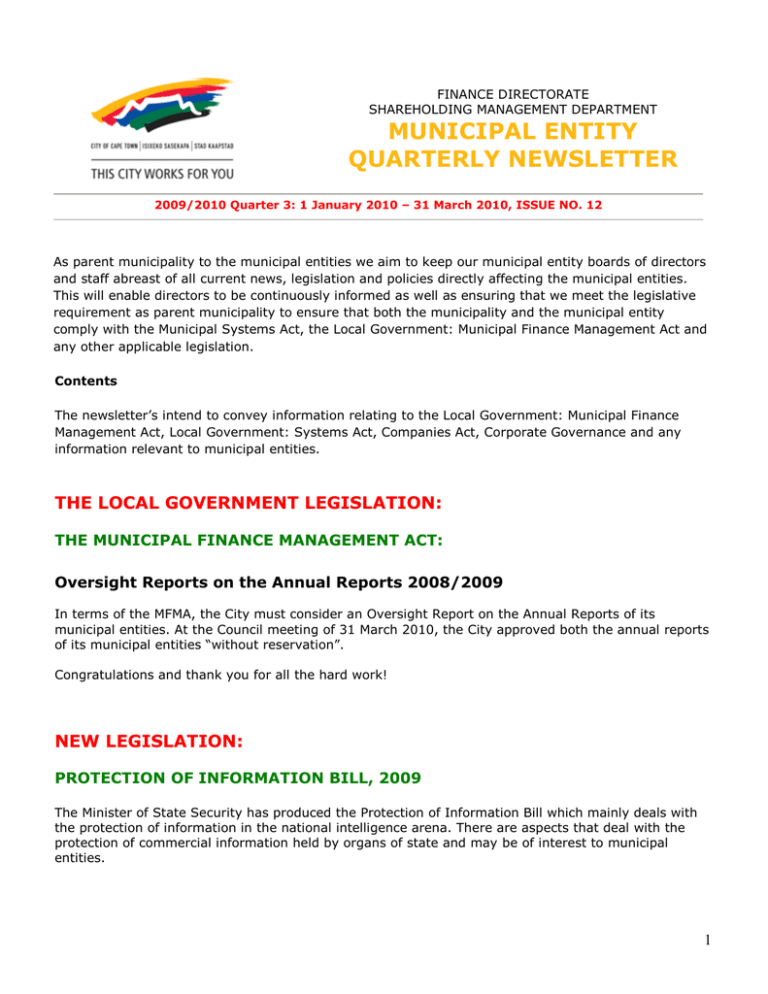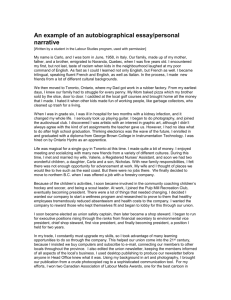
FINANCE DIRECTORATE
SHAREHOLDING MANAGEMENT DEPARTMENT
MUNICIPAL ENTITY
QUARTERLY NEWSLETTER
Analyst
2009/2010 Quarter 3: 1 January 2010 – 31 March 2010, ISSUE NO. 12
As parent municipality to the municipal entities we aim to keep our municipal entity boards of directors
and staff abreast of all current news, legislation and policies directly affecting the municipal entities.
This will enable directors to be continuously informed as well as ensuring that we meet the legislative
requirement as parent municipality to ensure that both the municipality and the municipal entity
comply with the Municipal Systems Act, the Local Government: Municipal Finance Management Act and
any other applicable legislation.
Contents
The newsletter’s intend to convey information relating to the Local Government: Municipal Finance
Management Act, Local Government: Systems Act, Companies Act, Corporate Governance and any
information relevant to municipal entities.
THE LOCAL GOVERNMENT LEGISLATION:
THE MUNICIPAL FINANCE MANAGEMENT ACT:
Oversight Reports on the Annual Reports 2008/2009
In terms of the MFMA, the City must consider an Oversight Report on the Annual Reports of its
municipal entities. At the Council meeting of 31 March 2010, the City approved both the annual reports
of its municipal entities “without reservation”.
Congratulations and thank you for all the hard work!
NEW LEGISLATION:
PROTECTION OF INFORMATION BILL, 2009
The Minister of State Security has produced the Protection of Information Bill which mainly deals with
the protection of information in the national intelligence arena. There are aspects that deal with the
protection of commercial information held by organs of state and may be of interest to municipal
entities.
1
Section 2 sets out the objects of the Bill:
Objects of Act
2. The objects of this Act are to(a)
regulate the manner in which State information may be protected;
(b)
promote transparency and accountability in governance while recognising that State
information may be protected from disclosure in order to safeguard the national interest
of the Republic;
(c) establish general principles in terms of which State information may be handled and
protected in a constitutional democracy;
(d) provide for a thorough and methodical approach to the determination of which State
information may be protected;
(e) provide a regulatory framework in terms of which protected information is safeguarded
in terms of this Act;
(f) define the nature and categories of information that may be protected from destruction,
loss or unlawful disclosure;
(g) provide for the classification and the declassification of classified information;
(h) create a system for the review of the status of classified information by way of regular
reviews and requests for review;
(i) regulate the accessibility of declassified information to the public;
(j) harmonise the implementation of this Act with the Promotion of Access to Information
Act, and the National Archives and Records Service of South Africa Act, 1996 (Act No. 43
of 1996);
(k) establish a National Declassification Database of declassified information that will be
made accessible to members of the public;
(l) criminalise espionage and activities hostile to the Republic and provide for certain other
offences and penalties; and
(m) repeal the Protection of Information Act, 1982 (Act No. 84 of 1982).
The Bill can be accessed at:
http://www.pmg.org.za/files/bills/100309protectionofinformationbill.pdf
2
PROTECTION OF PERSONAL INFORMATION BILL, 2009
“The Protection of Personal Information Bill, 2009, emanates from the South African Law Reform
Commission’s report on privacy and data protection. The Bill aims to give effect to the right of privacy,
by introducing measures to ensure that personal information of an individual is safeguarded when it is
processed by responsible parties. The Bill also aims to balance to balance the right to privacy against
other rights, particularly the right to access to information, and to generally protect important
interests, including the free flow of information within and across the borders of the Republic.”
The Bill can be accessed at:
http://www.pmg.org.za/files/bills/090825b9-09.pdf
GENERAL:
LABOUR LAW: Article by Cliffe Dekker Hofmeyr
“Labour Broking Agreements under Attack”
The following article was written by Faan Coetzee in the March 2010 “Employment Alert” Newsletter
produced by Cliffe Dekker Hofmeyr Attorneys:
“The Labour Court in a Judgement of 10 March 2010 struck down a popular clause in a labour broking
contract between the Labour Broker and the client as unlawful and against public policy. A common
provision in agreements between Labour Brokers and their clients oblige the Labour Broker to remove
from the client’s premises an employee upon the request of the client.
The Labour Court in Simon Nape v INTCS Corporate Solutions (Pty) Ltd, case JR617/07 held that such
an agreement between Labour Broker and the client, where such removal results in the employee
losing his or her employment with the Labour Broker, is against public policy and an unlawful breach of
the employees right to fair labour practices in terms of the Labour Relations Act.
In this case, the client submitted a request and the Labour Broker removed the employee, disciplined
the employee with a final written warning for the conduct reported by the client and returned the
employee to the client.
The client did not like the outcome of the disciplinary measures and refused the employee access to its
premises. As a result, the Labour Broker in terms of the contractual provisions between the parties had
no choice but to remove the employee and, as it could not place the employee elsewhere, retrenched
the employee. The retrenchment was held to be substantively unfair.
The Judgement will have far reaching consequences for contracts between Labour Brokers and their
clients.
The judgement is based upon the right to fair labour practices for all employees. Employees should not
lose their employment just because the client does not wish to have the employee on its premises. The
principle will also affect the termination of the employment of employees on fixed term contracts under
similar circumstances.”
3
DIRECTORS BEWARE!
The following is an extract from the COSECS E-Newsletter:
“In any company, it is the company's directors who have primary legal responsibility.
Directors and company secretaries could be held jointly liable for failures to meet the provisions of
the Companies Act (except for filing company accounts, for which directors alone are responsible).
• You could incur fines or even criminal charges for failure to file the Annual Return.
• You could, potentially, be disqualified, prosecuted or made liable for company debts if the
law is broken.
• You could be subject to criminal proceedings, if the company trades fraudulently, or if company
funds are misappropriated.
• If you are also a director, you could be held personally liable for the company's debts, if there has
been wrongful trading. Failure to ensure that the directors are acting properly in the conduct of the
business could leave you with personal responsibility for its debts.”
Please contact Louise Muller (021 4003940) or Richard Wootton (021 4002701) if you have any queries
in respect of this newsletter.
Although every effort is made to check the accuracy and quality of the information supplied, The City
cannot be held responsible for any errors that may arise.
Copyright(c) City of Cape Town 2007. All rights reserved. No part of this newsletter may be reproduced or transmitted in any form
without written permission from the City of Cape Town, Finance Directorate, Shareholding Management Department.
4







